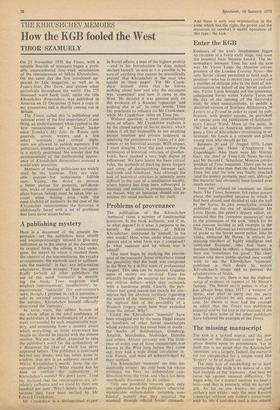A publishing mystery
Here is a document of the greatest im-. portance—yet the publishers have utterly and uncompromisingly refused to give any indication as to the source of the document, its original form, the editing it had under- gone, the means by which it reached them, the identity of the intermediaries, the royalty arrangements, the methods used to authenti- cate the material: in fact, any information whatsoever. Even stranger, Time Inc speci- fically forbade all other publishers the use of the word 'memoirs' in describ- ing the book; Time magazine itself employs 'reminiscences', 'recollections', 're- membrances', 'narrative' (for convenience's sake, though, I propose to call it memoirs— only in inverted commas). To compound the mystery, Khrushchev himself officially disavowed the 'memoirs'.
In some ways, the oddest feature of the whole affair is the total confidence of the publishers in the authenticity of a docu- ment surrounded by such impenetrable mys- tery, and emanating from a country about which everything, as bitter experience has taught us, should be treated with the utmost caution. We are, in effect, expected to take the publisher's word for the authenticity of a document the likes of which has never appeared before. 'The publisher is convinced beyond any doubt, and has taken pains to confirm, that this is an authentic record of Nikita Khrushchev's words' (note the cir- cumspect phrasing!). What exactly has 'he done to confirm the authenticity of Khrushchev's words? We don't know. Time Inc declared that the reminiscences are 'ab- solutely authentic and we stand by them one hundred per cent'. Why? Solely, it appears, because they have been verified by Mr Edward Crankshaw.
Mr Crankshaw is a distinguished expert in Soviet affairs, a man of the highest probity —and in his Introduction he does indeed declare himself 'as sure as it is possible to be sure of anything that cannot be scientifically proved' that Khrushchev is 'the man who speaks in these pages'. Yet Mr Crank- shaw himself states that he knows nothing about how and why the document was 'assembled' and how it came to the West. He decided it was genuine only on the evidence of a Russian typescript 'and nothing else at all'. In other words, Time Inc proclaims its reliance on Mr Crankshaw, while Mr Crankshaw relies on Time Inc.
Without question, a most unsatisfactory state of affairs. Mr Crankshaw explains it by the closed nature of Soviet society, which makes it all but impossible to use anything except intuition and private judgment in assessing the genuineness or falsity of a doc- ument or an historical account. With respect, I must disagree. Over the past century the techniques of historical criticism, of Quellen- kritik, have reached a very high degree of refinement. We have learnt the basic critical rules, the methods of tracking down forgery and error, of distinguishing between fact, half-truth and falsehood. And although the task of historical criticism is infinitely more difficult in the case of a totalitarian society, where history has long been submerged in ideology and politics in propaganda, that is no reason why an historian should not re- nounce the usual methods of his craft.










































 Previous page
Previous page